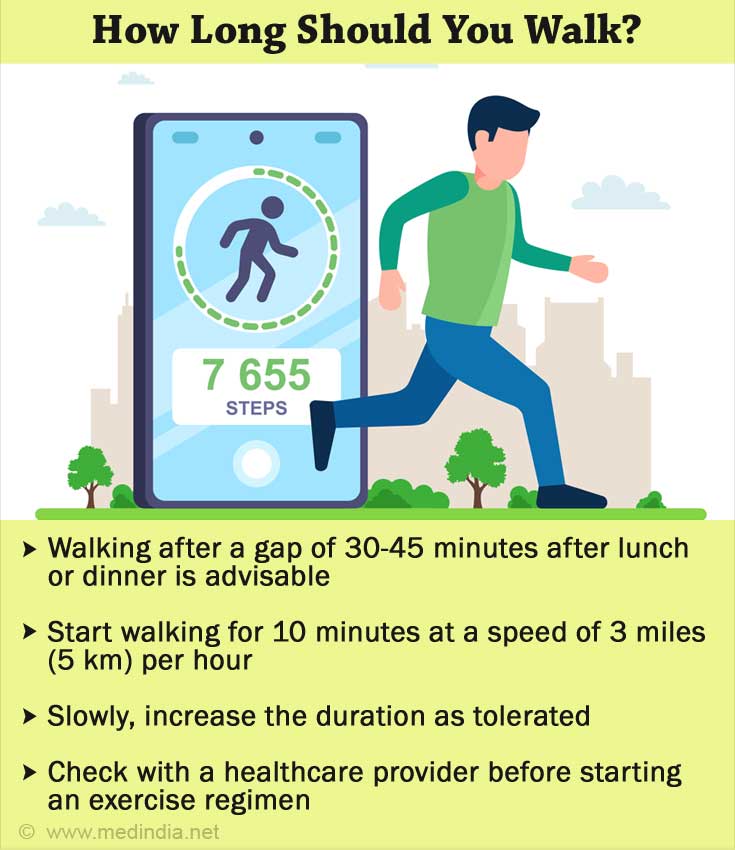- Walking just after a meal seems to be more effective for weight loss than waiting for one hour to walk after a meal - (https://www.ncbi.nlm.nih.gov/pmc/articles/PMC3119587/)
- Exercises to improve digestion - (https://www.axahealth.co.uk/health-information/gut-health/exercises-to-improve-digestion/)
In recent years, there has been a growing trend in the fitness community, and many Indian households do step out for a walk after lunch or dinner before hitting their beds to improve digestion.
Though walking is a low-impact activity that offers many health benefits, there is limited evidence on the benefits of going for a walk after eating.
People should know more about the specific benefits of walking after eating, the potential downsides, and how to determine the ideal walk length and intensity for a complete lifestyle changeover.
Health Benefits of Walking After Dinner
Improved digestion
A significant potential benefit associated with walking after eating is improved digestion. Body movement can fasten digestion by stimulating the stomach and intestine to move food more rapidly through it.
In addition to this, low to moderate physical activity after eating may have a protective effect on the gastrointestinal (GI) tract and reduce the chance of common gastrointestinal complaints such as bloating, gas, and heartburn.
Regulates blood sugar
After eating a carbohydrate-rich meal, the blood sugar level increases temporarily. In a non-diabetic person, the body will release insulin to lower the blood sugar level.
Whereas in a diabetic person, a rise in blood sugar after eating carbs is a normal occurrence. This is because carbs turn to sugar as the digestive system breaks them down. The sugar then enters the bloodstream and supplies the body’s cells with energy.
In healthy individuals, the pancreas releases enough insulin to regulate blood sugar but in impaired blood sugar processing, walking after eating may prevent an excessive spike in blood sugar, thus reducing the amount of insulin or oral medications required.
While post-meal exercise is particularly impactful for those with diabetes, others can benefit from its blood-sugar-lowering effects as well.
Promotes weight loss
It is a well-known fact that exercise plays a major role in weight loss combined with a proper diet. To promote weight loss, being in a calorie deficit state is important. A calorie deficit means burning more calories than consumed.
Walking after meals could help in reaching a calorie deficit, if consistently maintained, can aid in weight loss.
Supports mental health
Walking is a possible way to improve mental health because it reduces stress hormones, including adrenaline and cortisol.
When a person goes for a walk, the body releases endorphins that act as natural painkillers. The endorphins decrease discomfort, boost mood, reduce stress, and induce feelings of relaxation.
Improves sleep
Regular exercise, in any form, can help relieve insomnia (a common sleep disorder). Going for a leisurely walk after dinner also increases the amount of slow-wave, or deep, sleep a person gets at night.
Lowers blood pressure
Regular physical activity can lower blood pressure and LDL cholesterol, which is good for heart health. This protects against heart disease and stroke.
For optimal heart health, the Centers for Disease Control and Prevention (CDC) recommends that people get 30 minutes of moderate-intensity exercise at least 5 days per week.
People can quickly achieve this by taking either 30-minute walk after a meal, or three 10-minute walks after breakfast, lunch, and dinner.
Reduces bloating and discomfort
After a large meal, bloating can be common, but a short walk might provide relief. Gentle movement supports digestion, helping gas and waste move through the system, easing discomfort and the feeling of fullness. Walking can also release trapped gas, making you feel more at ease and less bloated.
Boosts creativity and clears the mind
Taking a walk after dinner can provide a perfect opportunity to clear your mind and boost creativity. Moving away from the hustle and bustle and engaging in a calming, repetitive activity like walking helps you focus and refresh your thoughts. Many individuals find that walking leads to unexpected moments of clarity or inspiration, as the rhythmic movement encourages new ideas. This simple exercise enhances brain activity, improves blood flow to the brain, and offers a mental reset, often resulting in fresh insights and solutions to problems.
Disadvantages
Eventhough walking is a safe and healthy activity for most people, some individuals may experience abdominal pain, fatigue, or discomfort if they go for a walk immediately after eating. This occurs if the food in the stomach moves around, inhibiting digestion.
Walking after a gap of 30-45 minutes after lunch or dinner is advisable to experience the most benefits. Every person’s digestion is different, they should pay attention to how they feel after meals and learn what works best for them.
How Long Should You Walk

It is advisable to start walking after meals for 10 minutes and then increase the duration as tolerated.
By completing three 10-minute walks per day, you can easily accumulate 30 minutes of daily physical activity, thus meeting the recommended guidelines.
Keeping your walks to around 10 minutes and at a speed of 3 miles (5 km) per hour will yield the potential benefits of preventing an upset stomach.
Though the intensity is generally low, it’s important to check with a healthcare provider before starting an exercise regimen if you have any pre-existing conditions.











